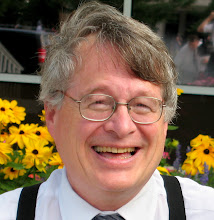Remarks made by H. Tracy Hall, Jr., Thursday, May 6, 2004, at a dinner at the University Park Hotel, Salt Lake City, Utah, recognizing H. Tracy Hall, Sr. and others for an honorary doctorate to be presented at the University of Utah commencement the following day. This is a reconstruction from memory, for Dad on Fathers’ Day, June 20, 2004. Parts may be missing, and parts may have been embellished, but I hope that the spirit of gratitude that I feel for my wonderful heritage remains.
My name is Howard Tracy Hall, Jr. That name has opened a lot of doors for me throughout my life, most of them undeserved. My father has set a standard for genius, creativity and accomplishment that I can never equal. However, when it comes to his integrity, goodness, kindness, and love for learning, I still have hope.
Let me tell you something about my father’s name. Howard Hall was a bachelor in his 30’s, a teamster in Ogden, a Fabian socialist and an atheist. Then he fell in love with Florence Tracy, saw the light, joined the [LDS] Church, and became an ardent capitalist. They named their first-born Howard Tracy, but they called him Tracy, which says something about his mothers’ influence. When Tracy was still very young, perhaps eight, his parents would take him and his brother Gene into town about once a week to shop, pulling a little wagon for their groceries. They would drop Dad and Gene off at the Carnegie library while they ran their errands. Howard said to him, “See, great wealth isn’t necessarily evil -- look what Andrew Carnegie has done in giving us this library.” Tracy would devour every science book he could find. When he was in the 3rd grade the school gave a test to all the students, and when the results came back they called Howard and Florence to the school to ask how it was possible that this young farm boy could have achieved the highest score for all grades in the entire county. That love of learning and discovery that they cultivated in their children continued throughout their lives. I remember well how Howard, in his old age, was experimenting with bubbling automobile exhaust through coffee, hoping it would clean it up, “because there has to be some use for coffee.” Like Howard, Tracy was really just a tinkerer. But he got lucky.
The love of learning that he received from his parents continued with him, and when he got all the science he could get at Weber College, he came to the University of Utah. He chose the “U” so that he could hitchhike home to Ogden on weekends to see his sweetheart, Ida-Rose. By the time he got his bachelors degree, Mom and Dad were married, and his advisors recommended that he go back east to pursue his Ph.D. Purdue had a great program in chemistry, and they also promised married students’ housing. Dad went back alone to check it out, only to learn that the housing was still on the drawing board. He stayed one year to study and teach while Mom stayed in Utah. Finally the department head told him that Henry Eyring had just gone out to Utah, and that he should go back and study with him. Dad was Eyring’s first graduate student at the U, and Eyring became a beloved mentor. Dad and Mom lived in University Village with the first three of their seven children. One of my earliest memories of my father is of this strange man in a strange black robe and strange black cap tossing me in the air.
Another vivid memory I have is of that day in December in 1954, when I was 9 years old. My father came home all excited with a secret to tell Mom. We begged and begged to know the secret, but he would only tell Mom. I didn’t find out that my Dad had made diamonds until the kids at school told me they had seen his picture in the newspaper.
After Dad came to BYU he continued his friendship with colleagues at the “U”. Several times he took me to hear Eyring lecture, and I knew quite a bit about reaction rate theory before I knew much at all about chemistry. One of Eyring’s lectures still influences my work in science. He taught about the utility of making a model as an aid to learning about the world, but he cautioned us not to fall in love with our models, because the real world is always infinitely more complex.
I am thankful for the love of learning that has come down to me from my parents and grandparents, and I am thankful for the contribution that this institution has made to our family.
Thank you.

No comments:
Post a Comment